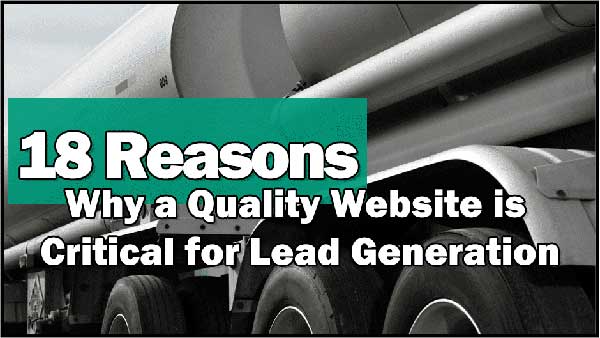Your website is like an 18-wheeler: it’s got to be powerful & robust, or it will fail to carry the traffic we all strive towards. If you think a Facebook page is all you need for your Business, we can think of 18 reasons why you may want to review your strategy. Without a quality website, you’ll be missing a vital part of your marketing strategy and lose out on the leads you could be generating.
Here’s how your website is the most critical part of your strategy, especially when it comes to generating leads—and directing those leads deeper into your sales funnel.
Table of Contents
ToggleThe Web’s an Attraction
Just like a spider web, you need to have feelers out that “reel in” the leads for a sale. Being able to orchestrate the perfect coordinated plan requires you to have a hub for all your activities to center around. Having that center controlled by a third-party and their rules, such as Facebook, Google+ or others is leaving the fate of your company to their whims. Get your own space and control it yourself.
All Roads Lead to Rome
Every marketing channel you use is a spoke in your marketing wheel, and every one is connected to the hub. Without a quality website, you have no way of tying your multi-channel marketing efforts together, and your activities can appear random and disorganized. A planned, structured website can serve as a perfect hub for your social media marketing, for example, says Forbes contributor and Huffington Post columnist Davia Temin (@DaviaTemin). Make sure all your marketing efforts lead back to your website, where you can capture users’ information and generate qualified leads.
Lively Landing Pages
The last thing you want, however, is for all paths to lead directly to your home page. There’s little as frustrating for a prospective client than clicking to get more information and finding himself on a general page. What you need as part of a quality website are customized landing pages for each of your offers, which are destinations for each of your pathways.
Leads coming from your YouTube channel, for example, have different content and message needs to those coming from Pinterest, your blog or your radio ad. They also fall into different demographic categories, according to Pamela Vaughan (@pamelump) of HubSpot. To convert the visitor into a lead, your website should offer a free webinar, whitepaper or eBook on a topic they have already shown an interest in.
It’s Your SEO Driver
SEO is big. Not only that, it’s crucial to the success of your inbound marketing strategy that users can find you on the search engines. To do this, you need to rank in search according to a number of conventional criteria identified by Dr. Matthew Peters (@dr_pete) and the data science team at Moz.
Mobile is Making It
With 60% of Internet traffic currently coming from mobile devices, businesses with a static desktop design website are stuck in the proverbial “last century” of website marketing, and are leaving up to 60% of their potential leads on the table. It’s important to be aware of the need for a responsive website design, says Shawn Hessinger (@Shawn_Hessinger), executive editor at Small Biz Trends.
Fatal Attraction
Through all of the statistics and surveys one thing still remains clear for inbound digital marketing, “Content is king.” Consumers that are not ready to buy, but are in the research phase are attracted to engaging and informative content. To make this work for you, you need to produce content for every stage of your prospect’s buying cycle, and different content for different segments of your target demographics. And to attract the search engines, you will need to renew it frequently.
Give to Get
Nothing in life is free. If you expect your prospects or leads to give up their digits (contact info), you need to give them a reason to. Your website provides that opportunity through quality landing pages and downloadable content, according to Social Media Examiner guest blogger Kristi Hines (@kristihines).
Webinars Win
Hosted directly through your website, webinars can provide a powerful tool to attract visitors, boost search rankings and further your lead in the buying process by helping them understand your business, products or services and expertise.
The Word of You
Another tool to convince potential leads to hand over their contact information includes the written word. Ebooks, white papers, blogs and advice columns hosted on your website or in another channel provide the information context that some of your prospects need to further their decision-making process.
Making sure your content is in the best format and designed to captivate is of the utmost importance. Studies show that web users only read about 28% of content (which means you will only read about 10 of these 30 reasons). Mashable provides great information on how to make your written content captivating, engaging and formatted to attract visitors.
You’re the Next Contestant…
Do you want to increase contact conversions by 700%? Adeel Vanthaliwala (@adeelvaqeel) provides a recipe for success for giveaways.
Everyone loves FREE, even if it means it’s not totally free. When you give away free content, ensure you are getting quality metrics in return. You should be getting a great return on traffic, contact details or other measurable statistics on your audience. If not, you are truly just giving away information.
Back to the Website
No matter what content you are producing, in what format or through which medium, it should all lead back to you and your website. Essentially, inbound marketing is the process of educating your potential client and giving compelling reasons why s/he should buy from you. At the end of the day, however, all this education needs to result in a conversion or a sale.
Building Trust
Building trust through great content is all about developing and nurturing your relationships through:
- transparency
- a great track record
- offering guarantees
- money-back promises
Trust starts by providing the information prospects want in places where they can benefit from it, according to Dan Newman (@danielnewmanUV), president of Broadsuite.
A Directed Funnel
Your website is the hub that provides the direction for all your funnel activities. It is the powerhouse behind your marketing providing a metrics base and place where consumers, once trusting and comfortable will keep coming back to; either to buy or receive further services.
A Call to Action
Did you know, 75% of all searchers to your website are considered information searchers? They are not ready to buy. They are not ready to trust you. They are looking for a reason to move on in the process with your company. If you want to capture that lead, prompt them with a good call to action (CTA). However, not all CTAs are created equal. Do you have the same CTA plastered across every webpage, whitepaper and blog article? If you do, you are losing leads. Develop a range of different CTAs and you’ll get better conversion rates on your website, according to HubSpot’s Christopher LoDolce (@ChrisLoDolce).
Data Collection
At the end of the day, your website is the most powerful data collector in your arsenal. Since it is your intellectual property, you have the most control over how much information you collect and what you do with it. If you are not studying your traffic sources, which channels are providing growth opportunities or even what time of day your traffic is arriving at your website from certain sources, you are missing opportunities.
Big Data = Big Info
In the digital world, every action creates an impression. It is the accumulation of these impressions that can provide real insight into consumer trends, according to the New York Times. If you are not listening to these impressions through the analytics from your website, it is possible you are chasing leads that are worthless–or leaving the most valuable leads in purgatory because they cannot find you.
Big Finish
The website in essence is your control center. It should be the nerve-center of your entire online marketing plan. This doesn’t mean you should abandon social media or other sources; actually you could be pushing consumers to these channels first. A quality website is your most important tool for organizing big data, providing amazing content and leading every single potential customer back to your “universe.” By making the content on your website engaging, socially shareable and designed to get contacts, you turn it into the most powerful marketing tool you possess.











